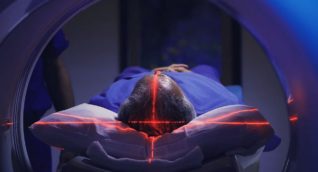Prostate specific membrane antigen radiotracer (PSMA radiotracer) is a medicinal compound, called a radiopharmaceutical, that is used in PET/CT imaging. There are several brand names for PSMA radiotracers, including Illucix, Pylarify, others. This radiopharmaceutical is composed of a targeting medicine bound to a tiny amount of radiotracer. It attaches to the PSMA protein on prostate cancer cells, and sends out signals that are picked up by the PET/CT scanner. These signals allow the scanner to form a picture of the location of any prostate cancer that might be present in the body, providing a more accurate and earlier detection of prostate cancer. This helps doctors and patients make better-informed treatment decisions.
This is a PET/CT scan that uses PSMA tracer to find prostate cancer. The PSMA tracer agent is injected by IV (intravenously), and attaches to prostate cancer cells, both in the prostate, as well as in metastases. Once it has attached to the cells, it sends out signals that are picked up by the PET/CT scanner, allowing it to form a picture of the location of any prostate cancer that might be present in the body. This provides more accurate and earlier detection of prostate cancer, helping doctors and patients make better-informed treatment decisions.
PSMA tracer is covered by Medicare and most private insurance.
Your health care provider may recommend this scan if you:
- Have certain types of prostate cancer that may be more likely to spread, or metastasize, as determined by biopsy or other factors.
- Continue to have an elevated PSA after prostate cancer treatment.
- Have small, metastasized tumors around your body.
Benefits
- The PET/CT scan with PSMA tracer is a minimally invasive method of finding prostate cancer in your body, often replacing the need for surgical diagnostic measures like biopsy.
- It can find very small tumors better than other procedures or tests, allowing your medical team to make informed recommendations for treatment.
- It is very specific to prostate cancer, because it targets the PSMA protein, which is found on the surface of more than 90% of prostate cancer cells. This protein is not found on other cells.
Risks
- The PET/CT scan with PSMA tracer uses a tiny dose of radiation. Excessive radiation can increase the risk for cancer, however the small amount of radiation received from this scan alone has been determined to be unlikely to cause cancer. Your medical team will recommend this test only if it is determined to be of benefit to you in finding prostate cancer. Please see ARA’s information on Radiation Safety.
- The PET/CT scan with PSMA tracer scan is available at ARA’s Midtown imaging center in Austin and takes a total of approximately 2 hours from check in to check out.
- You will be asked to change into a hospital gown for the procedure.
- Since metal can distort the CT images, all metal objects and jewelry should be removed prior to the exam. This may include hearing aids, removable dental prostheses, eyeglasses, piercings, hairpins, etc.
- The first step in the exam is to inject the radiopharmaceutical, PSMA tracer. Your technologist or EMT will place an IV into your hand or arm.
- After the injection, you will need to wait one hour for your body to absorb the PSMA tracer.
- The PET/CT scanner is a box-shaped machine with a large hole in the middle.
- Your technologist will help you onto a moveable exam table that passes through the scanner. You will need to remain as still as possible so the images will be clear. The technologist may apply straps or bolsters around your chest and abdomen to keep your body from moving.
- The technologist will then move behind a glass partition to supervise the scan. You will be able to talk with the technologist at all times.
- The scan will take about 30 minutes.
- After the scan, you will be able to go about your day normally.
- Be sure to drink plenty of water over the next few days after the exam to help flush the radiopharmaceutical from your body.
- You will be asked drink plenty of water the day before and day of your exam to ensure adequate hydration. You may take your medications as usual—please discuss this with your ARA scheduler and your health care provider.
- Be sure to tell the technologist about any illness or allergies you may have. Also, provide a list of your current medications and supplements.
To schedule a PET/CT scan with PSMA tracer, please call our scheduling team at (512) 453-6100 (toll free: 1-800-998-8214). A provider referral is required to make an appointment.
Coming in from out of town? Visit our “Traveling to Austin” page.
A radiologist who is trained to interpret molecular radiology examinations will analyze the images and send a report to the provider who referred you to ARA. The provider will then share the results with you.
To order a PET/CT scan with PSMA tracer for the detection of prostate cancer, please download our PET/CT Pre-Scheduling Form here.

